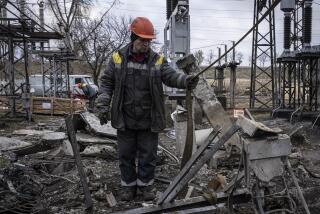Moscow Blizzard Buries Forecasters
- Share via
MOSCOW — When a surprise blizzard dumped nearly 2 feet of snow on the Russian capital in less than 24 hours, Moscow Mayor Yuri M. Luzhkov ignored the global trend of blaming El Nino. Instead of heaping scorn on this season’s meteorological menace, Luzhkov announced Monday that he was sacking the weathermen.
Russia remains in the throes of a seemingly endless winter this year, despite having already passed the spring equinox and moved the clocks into daylight saving time. As in much of the rest of the world, in this year of erratic weather phenomena, temperatures in western Russia have been fluctuating chaotically, dropping to numbing negatives one day only to shoot into springlike 50s a few days later.
Saturday treated Muscovites to their first serious suggestion of impending reprieve, as the mercury edged up to a respectable 48 degrees, and the sun that has rarely appeared since September blazed in an azure sky.
But Sunday dawned dark and discouraging. And, by midafternoon, another heavy snow was underway. Motorists who had removed their studded tires were spinning around like unskilled skaters, and the city’s tram network was paralyzed as ice derailed overhead power connections.
“Cars got stuck in the slush. Gusts of wind broke electrical wires in over 100 localities and broke down about 100 trees,” the Interfax news agency wrote of the overnight havoc.
Moscow’s fleet of 6,000 snowplows was summoned into action, and Luzhkov’s office declared the situation under control by the time the Monday morning commute was into its full, gridlocked glory.
But in a furor over the lack of warning given his road crews about the storm, the mayor’s office announced it was terminating its contract with the federal weather service, the Hydro-Meteorological Center. It provides weather forecasting throughout Russia.
Instead, Luzhkov’s press center told the Itar-Tass news agency, Moscow would be setting up its own system.
“I don’t mean to sound rude, but such ideas really make me laugh,” said Yuri S. Osipov, head of the Moscow subsidiary of the weather service. “In order to forecast the weather around Moscow, one needs to have an extensive network of ground stations monitoring and recording weather information elsewhere.”
Weather service officials conceded that they had erred in failing to alert Moscow authorities to the approaching storm but blamed Russia’s shaky economy as well.
“It was only partially human error. When a third of all meteorological stations in Russia have been shut down for lack of funding, our computers simply do not have enough information to make accurate forecasts,” said Viktor N. Strashoy, deputy head of the federal service.
Alexander Golubev, one of the Moscow subsidiary’s eight forecasters, observed that “Luzhkov is free to fret and fume” about having been caught with his guard down but that the mercurial mayor has no real authority to fire federal employees.
“No doubt, the sight of Luzhkov stamping his feet and shouting about bad weather can instill horror” in municipal employees, Osipov observed. He predicted--his staff hopes accurately this time--that the city government will quietly resume contracting for services with the federal center once the outside temperature rises and Luzhkov’s temper cools.
More to Read
Sign up for Essential California
The most important California stories and recommendations in your inbox every morning.
You may occasionally receive promotional content from the Los Angeles Times.














